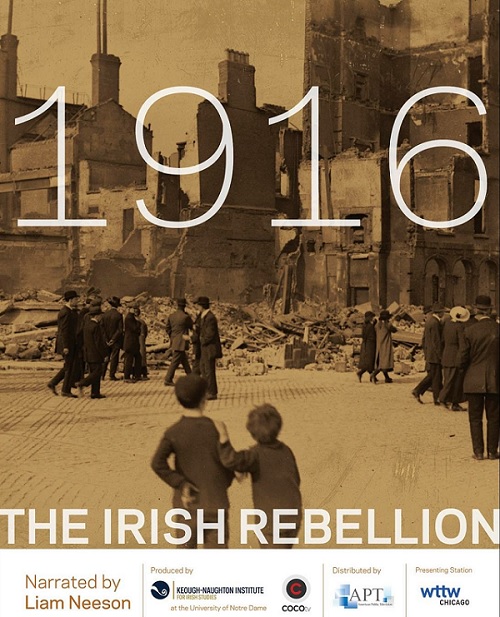
Directed by Ruan Magan with Liam Neeson as narrator.
Documentary, 87 minutes, in English.
Narrated by Liam Neeson, the film "1916 The Irish Rebellion" was an initiative of the Keough Naughton Intitute for Irish Studies at the University of Notre Dame in Indiana in the US, with two directors for two edits - Pat Collins for the 3-part tv documentary series and Ruan Magan for the 86 minute feature version we are about to see. To quote them "We wanted to do for 1916 what Ken Burns had done on American television for the Civil War – to bring serious history to a broad audience in a compelling manner". They then collaborated with RTE televison on the project.
The film examined the 1916 Easter Rising in the context of international events and the break-up of the British Empire, focusing on the setting and build-up to the Easter Rising, it examined the events of Easter Week 1916 on a day-to-day basis, and also dealt with the aftermath and the fundamental changes arising from these events.
The events involved a number of individuals and fours specific groups with different political outlooks - the Irish Citizens Army, the Irish Volunteers, Cumann na Bhan (Irish Women) and the Irish Republican Brotherhood - combining to rise up against British rule. They took over around 5 buildings and waited for the British to come; eventually they held out for 6 days but were outnumbered by around 20,000 British soldiers. 16 leaders were executed out of a total of around 500, and around 2,000 were later interred.
The film includes excerpts from interviews with various academics, including a number based in the US and some in the UK, as well as in Ireland. They covered the importance of people outside Ireland, in the US and the UK, in the events leadign up to the rising, and the issue of guns being brought to Ireland by ship. It also addressed the lack of military planning and reconnaissance as well as the overall doomed military strategies implemented.
Sunday's screening at the Cinémathèque was the 3rd of 3 events to mark the centenary commemorations of the 1916 Easter Rising which was such an important milestone in Ireland's history.
At Wednesday's lecture the Irish community in Luxembourg learnt how history changes, how it evolves as we discover more of what happened, sometimes by the discovery of documents and sometimes by individuals recalling memories, but also sometimes by having time to reflect on the past and looking forward to the future. We all have to rely on different accounts - some in newspapers, some in books, some on television and some in the cinema – all different perspectives. On Wednesday Dr Fearghal McGarry illustrated how the commemoration of the 1916 Easter Rising has changed over time, to today's one of inclusion.
Before the screening, Geoff Thompson of the Luxembourg 1916 Easter Rising Centenary Commemorations Committee introduced the film and the Ambassador of Ireland to Luxembourg, Peadar Carpenter, read a part of the Proclamation.








